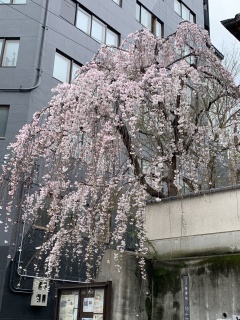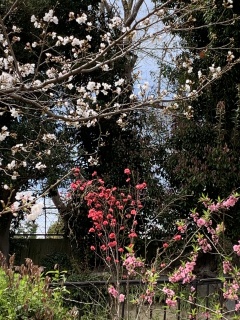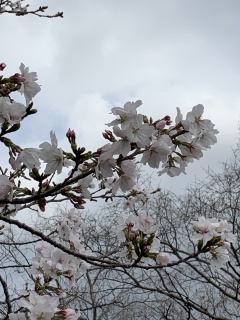Entry tags:
四月之子
Xi-laoshi, my Chinese conversation partner, recommended in passing that I get my reading practice from books designed for learners, like one she showed me called something like Beijing in Spring or The Four Seasons of Beijing, you can tell how seriously I was taking this genuinely thoughtful suggestion, I’m afraid. No! This kind of thing is why a lot of people don’t ever master languages! (Also an overgeneralization, I know—it works for some people—but still.) My f-list is full of people whose perfect English comes from TV shows and fic; I’ve just been reading Li Kotomi on learning her Japanese through anime and music. I got good at reading Japanese from a) middle-grade books aimed at Japanese preteens (I still fondly remember the first one I got all the way through, in which an eighth-grade girl daydreams about kissing her best friend, also a girl) and b) Japanese translations of novels I knew very well from having read them in English. I can’t imagine I’d have gotten even as far as I have in Chinese if I’d been dutifully reading graded readers, instead of watching dramas and the farming show and reading fics and the occasional article about Zhu Yilong. It only makes sense. Or am I biased? What do you think?
I finished my readthrough of the Joan Aiken Dido books, in general highly recommended. I think osprey_archer was talking about hesitating to read the later books because they get so dark, which is an interesting point. The two Is books--Is [Underground] and Cold Shoulder Road--are definitely dark in places, although not tonally so different from the rest of the series, and worth it for the characters and the wild plots and the language. The second-from-last book, Midwinter Nightingale, though, is the most bleak and depressing thing I’ve read in ages—most of the book is spent with various horrible people, and when we do see Dido and Simon they’re usually miserable and in trouble. It ends with a defeat for the villains, but I wouldn’t call it a happy ending in any sense. Not going back to reread that one. The very last one, The Witch of Clatteringshaws, which Aiken knew would be her last, also has its dark moments but is very funny here and there and ends genuinely happily. (I couldn’t resist the following selection, which is really not typically Aikeny at all but delightful.)
Y brought home this hilarious winter song called 布団の中から出たくない, ie “don’t want to get out of bed.” Highly recommended to anyone studying Japanese, and accessible even without Japanese thanks to the funny animation (for the southern hemisphere, they also have a summer song along similar lines). Although COMPLETELY different in style, I feel like clearly the Chinese equivalent is Liu Chang’s 再睡五分钟.
Since it’s timely, have Cesar Camargo Mariano (best known to me as Elis Regina’s husband, but also a great musician in his own right) doing April Child.
There’s a fancy coffee shop chain in Japan which uses city airport codes for its shop names, like NGS Coffee in Nagasaki and so on; the problem is that they’re based in Fukuoka, and so the company overall is known as FUK Coffee.
Photos: Spring is doing its thing and I have too many photographs, here are some and the rest will have to wait until the next post.
Be safe and well.
I finished my readthrough of the Joan Aiken Dido books, in general highly recommended. I think osprey_archer was talking about hesitating to read the later books because they get so dark, which is an interesting point. The two Is books--Is [Underground] and Cold Shoulder Road--are definitely dark in places, although not tonally so different from the rest of the series, and worth it for the characters and the wild plots and the language. The second-from-last book, Midwinter Nightingale, though, is the most bleak and depressing thing I’ve read in ages—most of the book is spent with various horrible people, and when we do see Dido and Simon they’re usually miserable and in trouble. It ends with a defeat for the villains, but I wouldn’t call it a happy ending in any sense. Not going back to reread that one. The very last one, The Witch of Clatteringshaws, which Aiken knew would be her last, also has its dark moments but is very funny here and there and ends genuinely happily. (I couldn’t resist the following selection, which is really not typically Aikeny at all but delightful.)
‘...perhaps, in a hundred years’ time, this day will be remembered by our grandchildren as the day when a not very large force of English beat off an attacking army of Wends who wanted to turn this island into a place where everybody spoke Wendish. Don’t you agree?’
’What’s Wendish like, then?’ one of the men enquired.
Rodney Firebrace spoke up. ‘Wendish is an awful language. It’s highly inflected — there are nine
declensions of nouns—
‘What’s inflected?’ somebody shouted.
‘When words have different endings to express different grammatical relations. And Wendish has thirty different kinds of verbs. You have to decline them as well as conjugate them.’
‘What’s verbs?’
‘I hit. You run.’
‘Who says we run? We ain’t a-going to run!’
‘No way!’
‘Hooray for English verbs!’
‘We don’t want no foreign verbs!’
‘Are you all with me, then?’ called Simon.
‘Sure we are!’
‘Let’s go!’
‘We'll show those Wends the way back to Wendland!’
‘Let ‘em wend their way!’
Also, anyone reading the Dido books should not miss lionpyh’s post-series fic Now, in the meanwhile, with hearts raised on high, which is one of the best fics I’ve ever read in any fandom ever as well as being an immensely satisfying conclusion.’What’s Wendish like, then?’ one of the men enquired.
Rodney Firebrace spoke up. ‘Wendish is an awful language. It’s highly inflected — there are nine
declensions of nouns—
‘What’s inflected?’ somebody shouted.
‘When words have different endings to express different grammatical relations. And Wendish has thirty different kinds of verbs. You have to decline them as well as conjugate them.’
‘What’s verbs?’
‘I hit. You run.’
‘Who says we run? We ain’t a-going to run!’
‘No way!’
‘Hooray for English verbs!’
‘We don’t want no foreign verbs!’
‘Are you all with me, then?’ called Simon.
‘Sure we are!’
‘Let’s go!’
‘We'll show those Wends the way back to Wendland!’
‘Let ‘em wend their way!’
Y brought home this hilarious winter song called 布団の中から出たくない, ie “don’t want to get out of bed.” Highly recommended to anyone studying Japanese, and accessible even without Japanese thanks to the funny animation (for the southern hemisphere, they also have a summer song along similar lines). Although COMPLETELY different in style, I feel like clearly the Chinese equivalent is Liu Chang’s 再睡五分钟.
Since it’s timely, have Cesar Camargo Mariano (best known to me as Elis Regina’s husband, but also a great musician in his own right) doing April Child.
There’s a fancy coffee shop chain in Japan which uses city airport codes for its shop names, like NGS Coffee in Nagasaki and so on; the problem is that they’re based in Fukuoka, and so the company overall is known as FUK Coffee.
Photos: Spring is doing its thing and I have too many photographs, here are some and the rest will have to wait until the next post.
Be safe and well.












no subject
("Spaced repetition" is a good point--I'm finding that, while not deliberately, longfic is also good for this! I'm thinking of a couple of those fics which are half again as long as they need to be because there's SO MUCH angst and miscommunication lol, meaning that, well, spaced repetition is what you get. ;) )
and glad you liked the photos <3
no subject
I'm not in any way trying to convince you, of course. Just trying to spread positivity and joy around the topic of language learning, which I find generally delightful and uplifting :)
To that point, I would add that the content of graded readers is highly variable, and some publishers have a clear focus they don't necessarily advertise for whatever reason.
For instance, Mandarin Companion is very western, mostly retelling English classics with the barest nod to Chinese culture. (This makes it uniquely easy for native English speakers who may already know the stories and will definitely recognize the sentence structure.)
Beijing Language & Culture University Press (BLCUP) is probably the gold standard in terms of traditional Chinese language and stories, though most of its readers are solidly intermediate (which is great, since there's not a huge market for non-beginner graded readers, but it does mean that being interested in the topic helps.)
Sinolingua produces an all-ages blend of traditional and easy in their "Rainbow Bridge" series, and these were far and away my favorite beginning readers. (They're usually too short to really reinforce the language, and they definitely introduce whatever random vocabulary they need for the story itself regardless of its utility elsewhere, but the stories are often funny and/or unpredictable.)
Chinese Breeze is more adult-oriented and modern, telling present-day fiction involving murder mysteries and computer hacking and all sorts of exciting things (including a China-typical and very sympathetic view of law enforcement) with vocabulary that's useful in day-to-day life.
...just in case you do find yourself looking into it later, I wanted to make sure I accurately if briefly represented "the publishers I suggest" :)
Totally agree about longfic; it has been better for my wuxia and xianxia vocabulary than any TV show, just because the volume of words is so much greater! ♥
no subject
I've found longfic (and presumably graded readers would be likewise) useful for learning/internalizing grammar as well as vocabulary; it's a lot easier to master, say, the 点了点头 construction once you've seen it a zillion times in various forms...